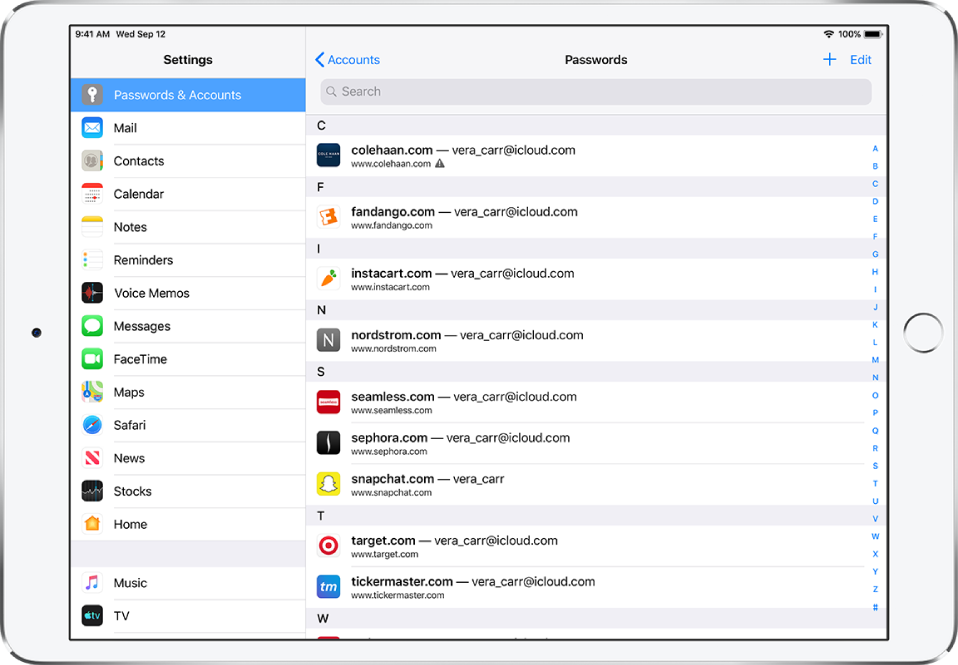iPad User Guide
- Welcome
- What’s new in iOS 12
-
- Wake and unlock
- Learn basic gestures
- Learn gestures for models with Face ID
- Explore the Home screen and apps
- Change the settings
- Take a screenshot
- Adjust the volume
- Change or turn off the sounds
- Search for content
- Use and customize Control Center
- View and organize Today View
- Access features from the Lock screen
- Travel with iPad
- Set screen time, allowances, and limits
- Sync iPad using iTunes
- Charge and monitor the battery
- Learn the meaning of the status icons
-
- Accessories included with iPad
- Connect Bluetooth devices
- Stream audio and video to other devices
- Connect to a TV, projector, or monitor
- Control audio on multiple devices
- Apple Pencil
- Use Smart Keyboard and Smart Keyboard Folio
- Use Magic Keyboard
- AirPrint
- Handoff
- Use Universal Clipboard
- Make and receive Wi-Fi calls
- Instant Hotspot
- Personal Hotspot
- Transfer files with iTunes
-
-
- Get started with accessibility features
- Accessibility shortcuts
-
-
- Turn on and practice VoiceOver
- Change your VoiceOver settings
- Learn VoiceOver gestures
- Operate iPad using VoiceOver gestures
- Control VoiceOver using the rotor
- Use the onscreen keyboard
- Write with your finger
- Control VoiceOver with Magic Keyboard
- Type onscreen braille using VoiceOver
- Use a braille display
- Use VoiceOver in apps
- Speak selection, speak screen, typing feedback
- Zoom
- Magnifier
- Display settings
- Face ID and attention
-
- Guided Access
-
- Important safety information
- Important handling information
- Zoom an app to fill the screen
- Get information about your iPad
- View or change cellular settings
- Learn more about iPad software and service
- FCC compliance statement
- ISED Canada compliance statement
- Class 1 Laser information
- Apple and the environment
- Disposal and recycling information
- ENERGY STAR compliance statement
- Copyright
Create website and app passwords on iPad
When you sign up for services on websites and in apps, you can let iPad create strong passwords for many of your accounts, or you can create your own passwords. iPad stores the passwords in iCloud Keychain and fills them in for you automatically, so you don’t have to memorize them. If you use the same password in more than one account, iPad flags it for you to change.
Note: For iPad to create and store passwords, iCloud Keychain must be turned on. Go to Settings ![]() > [your name] > iCloud > Keychain.
> [your name] > iCloud > Keychain.
Create a password for a new account
On the new account screen for the website or app, enter a new account name.
For supported websites and apps, iPad suggests a unique, complex password.
Do one of the following:
Choose the suggested password: Tap Use Strong Password.
Make up your own password: Tap Choose My Own Password.
To later allow iPad to automatically fill in the password for you, tap Yes when you’re asked if you want to save the password.
Automatically fill in a saved password
On the sign-in screen for the website or app, tap the account name field.
Do one of the following:
Tap the account suggested at the bottom of the screen or near the top of the keyboard.
Tap
 , tap Other Passwords, then tap an account.
, tap Other Passwords, then tap an account.
The password is filled in. To see the password, tap
 .
.
To enter an account or password that isn’t saved, tap ![]() on the sign-in screen.
on the sign-in screen.
View your saved passwords
Ask Siri. Say something like: “Show me my passwords.” Learn how to ask Siri.

To view the password for an account, tap it.
You can also view your passwords without asking Siri. Do one of the following, then tap an account to view its password:
Go to Settings
 > Passwords & Accounts > Website & App Passwords.
> Passwords & Accounts > Website & App Passwords.On a sign-in screen, tap
 , then tap Other Passwords.
, then tap Other Passwords.
Replace a reused password
To help you replace reused passwords with unique ones, reused passwords are flagged with ![]() in the passwords list.
in the passwords list.
Go to Settings
 > Passwords & Accounts > Website & App Passwords.
> Passwords & Accounts > Website & App Passwords.Tap any account flagged with a
 .
.Tap Change Password, then change your password on the website or in the app that appears.
Prevent iPad from automatically filling in passwords
Go to Settings ![]() > Passwords & Accounts, then turn off AutoFill Passwords.
> Passwords & Accounts, then turn off AutoFill Passwords.